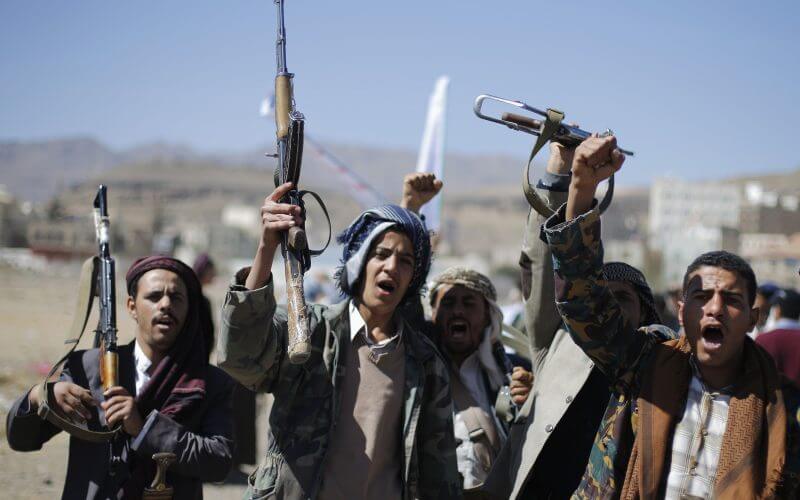The State Department announced Monday that it would not re-designate the Iran regime-backed Houthi rebels as an official terrorist group, despite cries and concerns from human rights activists and lawmakers in Congress.
According to State Department officials, re-designating the Houthis as an official terrorist threat is not a top action for the Department. Instead, the officials are currently focused on the ongoing United Nations truce in Yemen, trying to provide a dependable and sustainable opportunity for peace in the war-torn country. This latest statement on Monday came as Yemeni human rights activists last week visited Washington to press the President, the Secretary of State, and Congressional members, to re-list the Iranian-backed cell as a terrorist organization.
The human rights activists carried a letter to the White House which criticized the administration for de-listing the Houthis, warning the President about the terrorist cell's behavior, repression against ordinary Yemeni civilians, the humanitarian crisis in Yemen, and other factors. The signed letter was from 35 organizations advocating for Yemeni human rights, arguing that the Houthis must be held accountable for their activities, like recruiting 35,000 child soldiers in 2014.
White House officials who met with the activists stated that they viewed the re-designation of the Houthis on the State Department's Foreign Terrorist List (FTO) as an obstacle to creating peace between the Iranian-armed militia and the Yemeni government. Human rights activists who attended the meeting, like Dr. Wesam Basindawa, were upset with the administration's final decision and stated that the White House seemed more focused on renewing a failed truce than resolving the conflict and aiding the Yemeni people. While State Department officials told reporters that the administration would continue to look at humanitarian considerations as a critical factor regarding an FTO designation of the Houthis, human rights activists stated that the terrorist groups continue to conduct terrorist attacks and violate the cease-fire agreement.
In the letter, the activists reported that the Houthis have not moderated their actions or engaged in any productive dialogue, furthering the humanitarian crisis in the country. The activists point out that the Houthis have conducted multiple drone and missile attacks on Saudi airports, airfields, and oil installations. Additionally, the group continues to commit crimes like seizing cities, bombing civilians, booby-trapping roads and schools, sniping civilians, and displacing civilians from their homes.
Former Iranian State Department official Gabriel Noronha stated that terrorist organizations like the Houthis who behave in such a manner should be designated "unless their behavior changes and they abandon tactics of terror." Noronha argues that "there is no indication that withdrawing the FTO designation led to the UN-negotiated truce, which happened well after the sanction removal in early 2021, nor that restoring that sanction would end that truce - that's called gaslighting."
The Houthi insurgency in Yemen has been a prolonged conflict in the Middle East dating back to the early 2000s. After the Yemeni government arrested Hussein Badreddin al-Houthi, a radical religious leader and former parliamentarian official, Badreddin founded the group with support from the Islamic Republic of Iran, stating that his movement would purge the country of Saudi Arabian, American, and Israeli influence. In 2004, armed conflict between the Yemeni government and the Houthis erupted when the Yemeni president accused the Houthis and other Islamic groups of trying to overthrow the government and install a radical Islamic rule.
From 2004 to today, the Houthi rebels have continued to recruit civilians to their cause, receiving enormous amounts of military resources and training from the Iranian Revolutionary Guards Corps (IRGC), fighting against Yemeni government forces backed by Saudi Arabia and other Arab states. Throughout the conflict, many human rights activists and journalists in the war zone have reported on the Houthis and the damage they have enacted on the Yemeni population and the state's destruction.
In early June 2022, the United Nations announced that Yemen's warring parties agreed to renew a nationwide truce for another two months, prompting the Biden administration to revoke any designations against the Houthis, hoping to end the civil war. Members of Congress reacted to such decisions as outrageous and dangerous to the safety and security of American interests in the Middle East, citing the group's support from Iran and anti-American sentiments. "Congress can always pass legislation putting more responsibility toward designating FTOs back into their hands or mandate certain organizations, such as the Houthis, as FTOs," explained Noronha. "It's unlikely that any such measure would pass in this Congress with Democratic antipathy toward the measure but could possibly see some traction next year if both chambers trend toward Republican hands."










